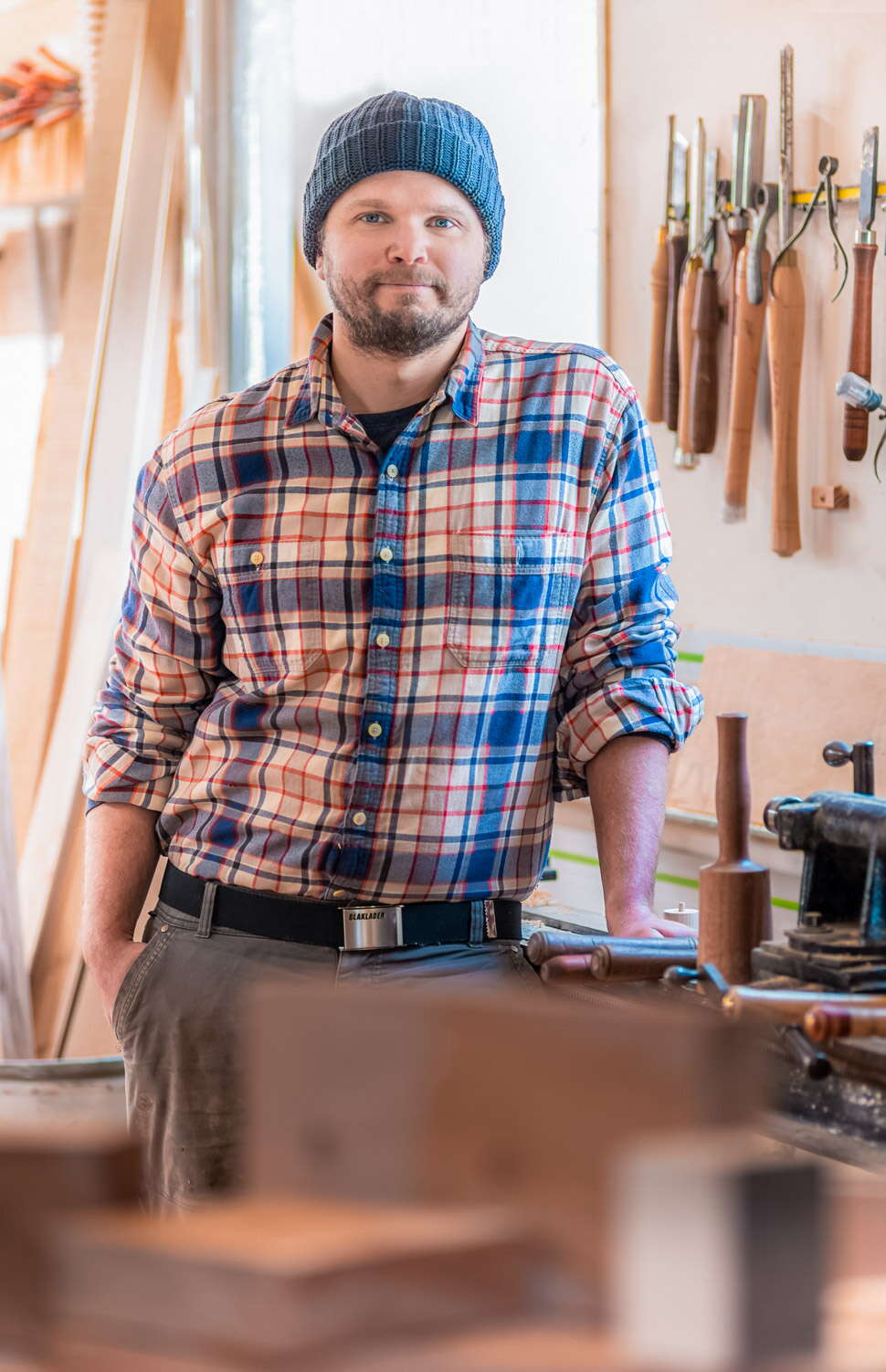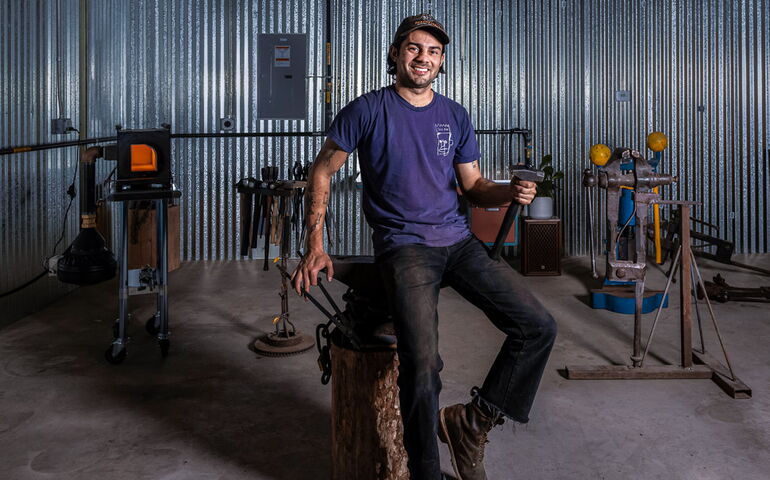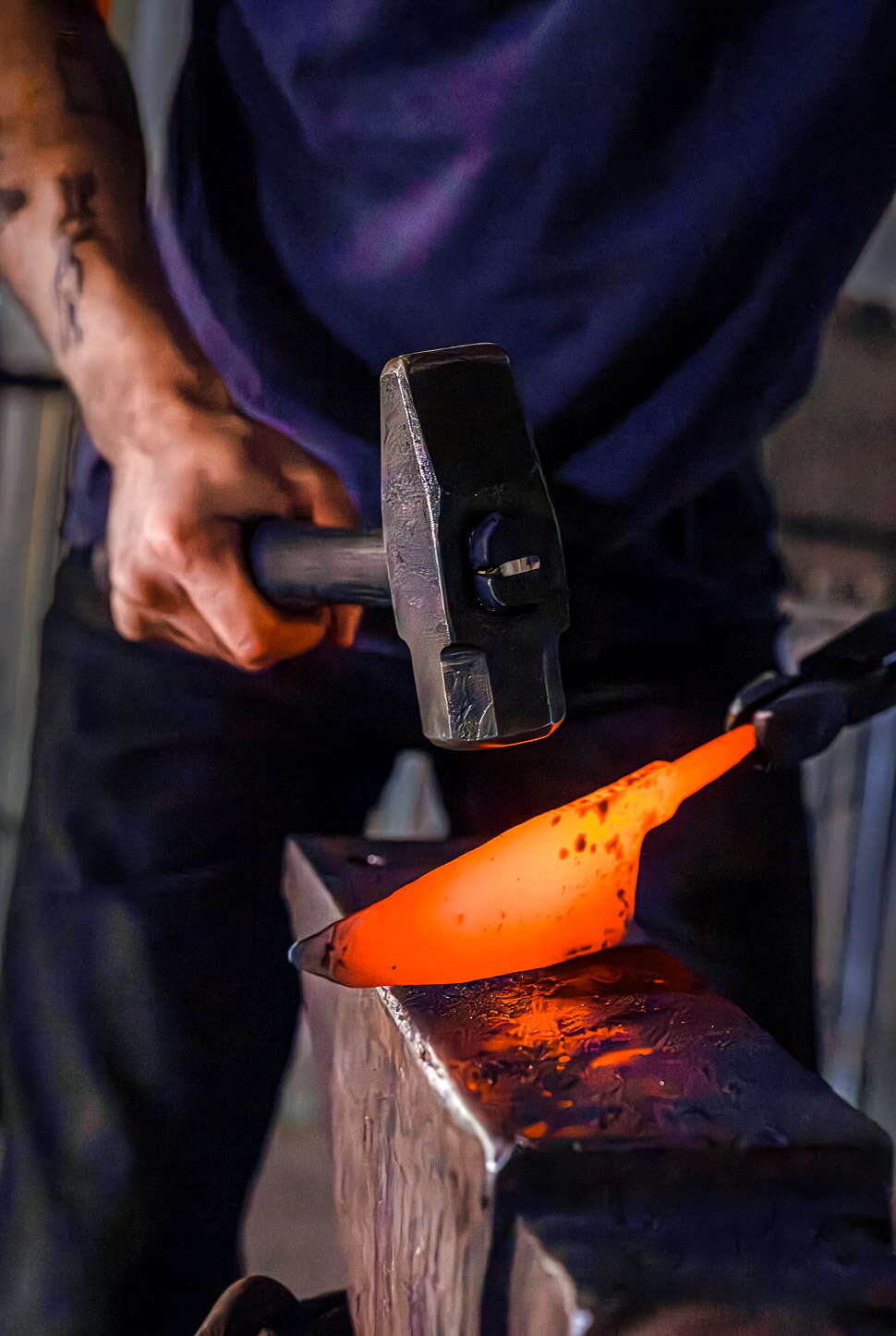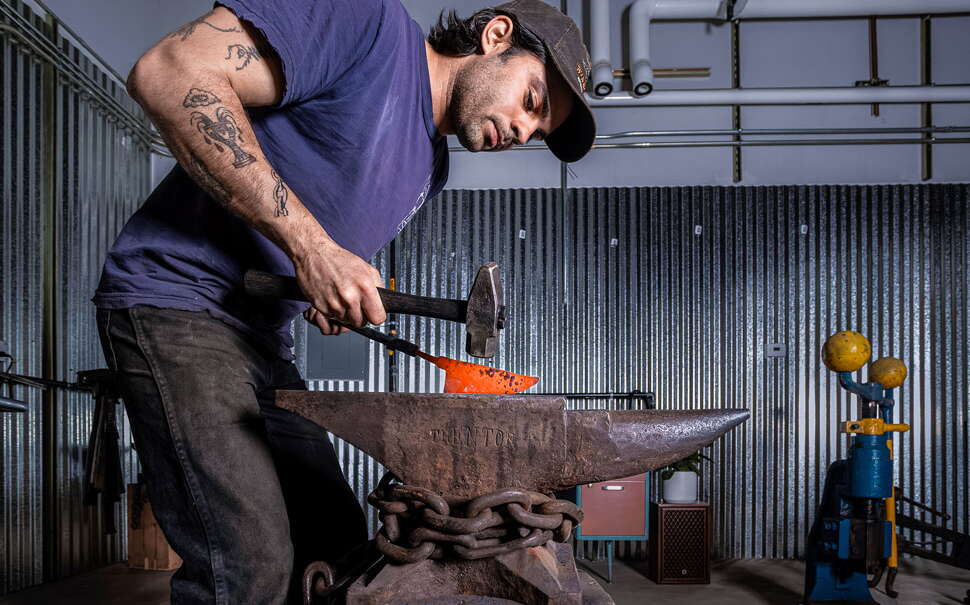
Sparked by an idea, small business owners go all-in to build their enterprise
 Photo / Tim Greenway
Kiran Chapman of Soma Metalwork
Photo / Tim Greenway
Kiran Chapman of Soma Metalwork
Niche small businesses are pretty much a brand for Maine, where owners build on a robust legacy of individual skill and enterprise.
They range from a blacksmith who forges Japanese-style knives to a self-taught maker of complex stairways to a locally sourced lumberyard. Common themes? A drive to navigate the journey from personal interest to enterprise, honoring heritage while rolling out new ideas.
Self-taught
George Reiche started Maine Stair Co. three years ago to design and produce custom stairs and stair parts at his Cumberland shop.
Production includes a three-story curved stairway with a tight inside radius and dramatic twisted handrail.
“It really pushed our limits as far as construction and fabrication,” he says.
Another stairway came with “super expensive” custom bronze balusters that required specialized tools to make.

“That was a whole other level of nervous,” he says, adding, “It was a fun one.”
Reiche is a 14th-generation Mainer who took up carpentry growing up: both of his grandfathers taught him woodworking from a young age.
He majored in studio art at Wheaton College and pursued glassblowing and metal and wood sculpture.
After college, he focused on historic renovation and historic millwork reproduction through his solo operation, Georgeworks. One vintage house had a great stair with a twisting handrail and mahogany newels and balusters.
Reiche was hooked. He taught himself lathe work from videos by an “old-school stair builder” in Rhode Island and soon had a commission to build a staircase with a “tangent” handrail — a geometric complexity that both twists and curves as it climbs.
“I took it on, not having any idea how I would do it.”
Tapping industry contacts and 200-year-old books, Reiche taught himself the method, recorded the build and posted it on Instagram, opening a world of stair aficionados. More projects and training ensued through a Biddeford contractor and a Rhode Island stair builder.

Despite trepidation, three years ago he closed Georgeworks and opened Maine Stair with one employee, Sam Miller. Reiche self-financed equipment such as a CNC machine and a big, five-horsepower shaper used to make jigs for curved parts.
“It sounds like a helicopter taking off,” he says of the machine.
Market gap
“I saw a hole in the market,” he says. “Most stairs are built on-site. Others build stairs in the shop then bring it on-site to install. So instead of installing a stair in three weeks or a month, for a complicated stair, we might be on site for four days after building it in the shop.”
Staircase construction is challenging because of the math involved and its multiple missions: creating a work of art that’s structurally sound, meets code requirements and falls within the owner’s budget constraints.
Even small jobs are fun. One involved a damaged portion of a 200-year-old railing.
“I took all these points of measurement and we fabricated a new tangent handrail to join with theirs,” he says. “It was super complicated, but super rewarding.”
Each year brings five or six stair builds, plus repairs and small jobs.
“Instagram has been huge advertiser for me,” attracting about 23,000 followers to date, he says. “I get some calls from people who go on the Stairbuilders Manufacturers Association and look by area. And stair builders pass jobs to one another.”
This year, Reich entered the association’s craft competition for the first time and won three awards for the curved stair and a straight stair.
The work is engaging. “Stairs fit into the balance of art and structure and math and being the centerpiece of a home,” he says.
From desk to forge
Soma Metalwork is the creative practice of Kiran Chapman, a blacksmith whose work focuses on kitchenware and home goods.
Originally from Harlem in New York City and coming from a family of artists and architects, Chapman got a degree in urban studies and studio art at Vassar College and worked in design and public relations in Manhattan. After 25 years of living in the Big Apple, he was increasingly drawn to a more self-sufficient and craft-based livelihood.

In 2018, he moved to Maine to study wooden boatbuilding at the Carpenter’s Boat Shop in the midcoast village of Pemaquid, soon becoming an instructor there. His fascination with metalwork began while training with a local knife maker, before starting a two-year apprenticeship at Wick’s Forge, a third-generation production blacksmith shop, then based in Pownal.
In 2022, Chapman started Soma Metalwork at Skyline Farm, a North Yarmouth museum of antique carriages and sleighs that had a small blacksmithing shop. In addition to running his own studio, Chapman now manages the sharpening department at Strata Portland, where daily exposure to a wide range of blades pushes him to keep diving deeper into metallurgy and knife geometry.
Chapman’s process of forging knives and kitchenware requires heating metal to over 2,000 degrees Fahrenheit before hammering it into shape while it is hot and malleable. Any object that needs to hold a sharp edge, such as chef’s knives, requires heat treating, a process that changes the structural composition of the steel, resulting in a much harder material that can be sharpened and resist wear, he says.

Vintage anvils
Now, Chapman is building his own workshop at 1 Industrial Way in Portland to use as a blacksmith studio, hold beginner knifemaking and blacksmithing classes and provide a small storefront.
“I’ve spent the last few months collecting the highest-quality anvils I can find,” he says. “With tariffs coming on, I felt inclined to nail down the equipment I need quickly. I now have six great anvils. Most are over 100 years old. I’m having custom stands made for each one, because they’re all different.”
Finding an appropriate location wasn’t easy.
“There are some really good deals on industrial spaces, but they’re typically over 10,000 square feet,” he says.
At 1 Industrial Way, he found a 1,500-square-foot former brewery space with concrete floors, existing utility hookups and industrial zoning. Mike Anderson of Malone Commercial Brokers represented the landlord, Aim One Industrial Way LLC, in the lease.
Chapman is maintaining the industrial feel while building areas for forging, grinding, welding and a small showroom.

“It’s going to feel like a working shop, but also a public-facing creative studio — raw, functional and intentional,” he says.
Chapman expects to open the workshop in mid-June, with blacksmithing classes going live on his website.
The location is great, he adds. Nearby attractions include breweries and an amusement center.
“Having public-facing businesses around me feels like a big plus,” he says. People will hear the blacksmithing shop and will be poking their heads in.”
Ups, downs, ups
In 2020, Michael Friedland and his partners — his sister Jennifer Friedland-Stora and Ryan Holland — opened the Lumbery, a building supply store in Cape Elizabeth.
The mission? Offer lumber from family-owned and -operated mills, with trees cut within 40 miles of the mills, catering to local contractors and do-it-yourselfer homeowners.
In 2023, the town of Cape Elizabeth sued the Lumbery over the location of outdoor display items and signage. Although the town later dropped the lawsuit, the partners were worn out and listed the real estate and inventory for sale in 2024.

But by January, there was a shift.
“We all love the Lumbery and we had a big meeting and we realized, Let’s go all in,” says Friedland.
Local sourcing
Friedland came to the enterprise from his handyman business, Willard Square Home Repair. Frustrated by the lack of nearby lumberyards, he figured that, since he had to stock his own wood, it would be great to open a store to sell wood and related items, with a chain-of-custody model that asks what are the social, environmental and economical effects associated with the items.
The partners renovated a former Cumberland Farms, all mainly self-financed through Friedland. It opened with building and garden supplies, including custom, in-house-built items such as garden arbors and raised garden beds; specialty items like northern white cedar, rough-sawn hemlock, live edge slabs and native plants; and a hardware section.
But the town’s 2023 lawsuit, based on a condition of the store’s initial site plan, meant that anytime Friedland wanted to move or change outdoor displays, he needed to apply for a plan amendment, which took time and money, he said at the time.
For the Lumbery, the arrangement was untenable because displays had to be adjusted based on demand, effectiveness and seasonality.
Between the pandemic and the lawsuit, the partners decided they didn’t have the energy or cash to continue operation. But they were “half-hearted sellers,” says Friedland. “We wanted to sell, but we didn’t want to sell. If someone came along with a great offer who would do amazing things with what we started, we would even be happy to work for them.”
They kept the store open. But loyal customers commented on the “sad” vibe.
“Lots of stores have managers or owners who drive the energy,” he says. “We weren’t doing that.”
Ultimately, they just needed time to rebalance. That January meeting was a pivotal moment.
“We had deep talks about a restructuring of who do we want to be, what do we want to sell, how do we want to look,” he says.
Protecting the spark
The realization? “We like the process of creation. We like selling people wood for building things. We don’t like selling mousetraps and light bulbs. The hardware items were distracting us.”
They cleared the hardware section, keeping essentials like tape measures and fasteners, and returned their focus to lumber and the wooden products they made in-house, and to customer service and messaging.
They expanded the outdoor displays and added lumber racks out front.
“In the past, we didn’t have lumber racks out front,” he says. “It was almost like lumber was an afterthought. We wanted to show that we are a lumberyard.”
Displays include cedar shakes, hemlock boards, Coast of Maine soil in various colors, native plants and hanging baskets and a tent for the discount cedar area, which people use for making garden beds. “The whole front is alive,” he says.
Now they’re looking to expand, offer classes in the cleared section and reboot their guest-speaker program.
“It’s like, your hands are around that little spark of flame,” he says. “Jen and Ryan and I were protecting this spark and it’s taking off.”










0 Comments